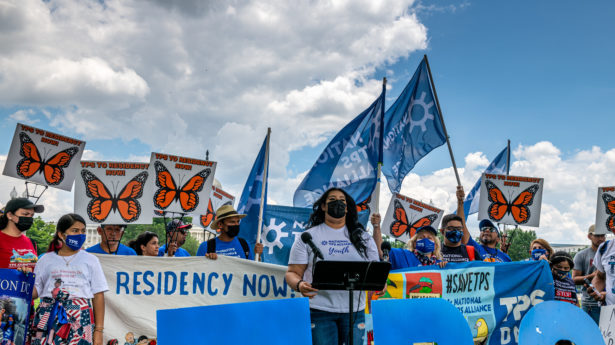The Unitarian Universalist Service Committee advances human rights through grassroots collaborations.
The Fight for Citizenship in Congress Continues… (Part 1)

By on November 13, 2021
In the first of a two-part series, we discuss how the U.S. budget can be used to provide a path to citizenship.
For much of the past year, UUSC and our partners have been lobbying Congress to include a path to citizenship for immigrants in upcoming COVID-19 recovery legislation. By doing so, we have only been asking politicians to be true to their word. In announcing the sweeping social spending package known as the “Build Back Better” bill, after all, both Congressional leadership and the White House pledged to include a path to citizenship. Moreover, this bill provides a unique opportunity to finally get citizenship enacted into law.
Today, we answer your questions about why we believe this victory is still attainable, and what the legislative roadmap looks like to get there.
Why should citizenship be included in “Build Back Better” legislation?
A few reasons: first, it’s what President Biden and leaders in Congress promised they would do. Second, in order to truly “build back better” from the COVID-19 crisis that has rocked the nation and the world, immigrants’ rights have to be part of the solution.
Throughout the pandemic, undocumented immigrants and those with temporary statuses have worked disproportionately in frontline industries, putting their lives at risk to keep others safe, healthy, and fed throughout the crisis. They are a crucial part of the nation’s pandemic response, and they deserve to receive full recognition of their equal rights and status as we emerge from this shared disaster together.
Finally, the “Build Back Better” package provides a unique opportunity to finally accomplish this. For too long, a majority of the public has demanded a path to citizenship without Congress moving the needle. The main reason has not been lack of political support (indeed, citizenship has passed multiple times in the House), but rather antiquated Senate procedures that prevent bills from passing with fewer than 60 votes.
Build Back Better will be able to avoid this supermajority requirement, because it is being considered under the distinctive procedure known as “budget reconciliation.” This allows measures with significant budgetary impact (such as a path to citizenship) to pass the Senate with only a simple majority. Congress must therefore make use of this opportunity before it closes to finally deliver on something the public demands, and that they have long promised.
But hasn’t the Senate parliamentarian ruled out this option?
No. The Senate parliamentarian is an unelected official who issues non-binding advisory opinions to Senate leadership on whether or not a particular provision satisfies the rules for reconciliation. The ultimate legal authority to decide on such a question rests with the Vice President as presiding officer of the Senate, or whomever she delegates to serve in her place.
Moreover, there are several strong reasons not to defer to the parliamentarian’s opinion in this case. For one thing, the reasons she gave for her conclusion were not persuasive. Numerous legal experts and immigration policy analysts have pointed out significant holes in her logic and therefore urged Vice President Harris to disregard her advice. Further, the parliamentarian’s past career as an immigration prosecutor raises serious questions about her neutrality in this matter.
Finally, disregarding the parliamentarian’s advice would not be unprecedented. In the 1960s and ‘70s, the Vice President put aside this official’s advice with some frequency. The Vice President should take the parliamentarian’s analysis into consideration, but if it is found to be tendentious and unconvincing (as in this case it is), she has every right to ignore it.
In part two of our series, we will answer more questions about the Build Back Better bill.
***
Photo Credit: iStock — JanaShea

